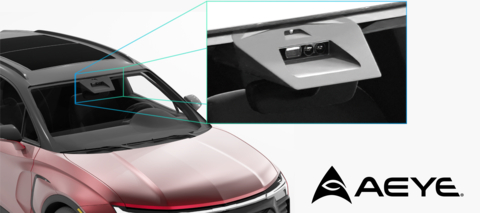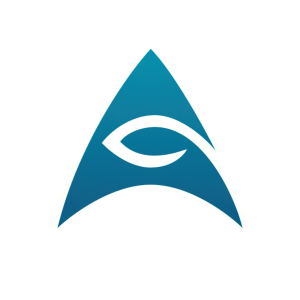AEye Introduces Apollo – the First Product in the 4Sight Flex Family
Apollo demonstrates the power of 1550 lidar technology

Apollo delivers best-in-class range and resolution in a small, power-efficient, low-cost form factor, enabling both automotive and non-automotive applications. (Graphic: Business Wire)
AEye CEO Matt Fisch, said, “We are pleased to announce the first product from the 4Sight Flex family a mere four months after unveiling the initial reference design. With Apollo, we are able to demonstrate the true advantage of our ultra-long-range lidar delivered in an incredibly compact form factor. This achievement underscores the scalability of our software-defined architecture.”
Apollo supports up to 120° horizontal and 30° vertical field of view, with long-range detection of up to 325 meters at
Apollo leverages proven components and supply chain partners, resulting in minimized technical risk, maximized supply chain readiness, and a very competitive price for performance. As part of the 4Sight Flex family, Apollo runs on AEye’s 4Sight Intelligent Sensing Platform. This platform delivers a highly programmable lidar solution that can be customized easily for each application and can be reconfigured through software, including over-the-air updates.
Apollo samples are expected to be available for customer demonstrations in June 2024.
About AEye
AEye’s unique software-defined lidar solution enables advanced driver-assistance, vehicle autonomy, smart infrastructure, and logistics applications that save lives and propel the future of transportation and mobility. AEye’s 4Sight™ Intelligent Sensing Platform, with its adaptive sensor-based operating system, focuses on what matters most: delivering faster, more accurate, and reliable information. AEye’s 4Sight™ products, built on this platform, are ideal for dynamic applications which require precise measurement imaging to ensure safety and performance.
Forward-Looking Statements
Certain statements included in this press release that are not historical facts are forward-looking statements within the meaning of the federal securities laws, including the safe harbor provisions under the United States Private Securities Litigation Reform Act of 1995. Forward-looking statements are sometimes accompanied by words such as “believe,” “continue,” “project,” “expect,” “anticipate,” “estimate,” “intend,” “strategy,” “future,” “opportunity,” “predict,” “plan,” “may,” “should,” “will,” “would,” “potential,” “seem,” “seek,” “outlook,” and similar expressions that predict or indicate future events or trends, or that are not statements of historical matters. Forward-looking statements are predictions, projections, and other statements about future events that are based on current expectations and assumptions and, as a result, are subject to risks and uncertainties. Forward-looking statements included in this press release include statements about the benefits, features, and advantages of AEye’s new 4Sight Flex product, Apollo, as well as the potential cost advantages, among others. These statements are based on various assumptions, whether or not identified in this press release. These forward-looking statements are provided for illustrative purposes only and are not intended to serve as and must not be relied on by an investor as a guarantee, an assurance, a prediction, or a definitive statement of fact or probability. Actual events and circumstances are very difficult or impossible to predict and will differ from the assumptions. Many actual events and circumstances are beyond the control of AEye. Many factors could cause actual future events to differ from the forward-looking statements in this press release, including but not limited to: (i) the risks that Apollo may not now, or in the future, deliver best-in-class range or resolution as a result of new or existing competitive products, or otherwise; (ii) the risks that Apollo may not productize into a small, power-efficient, or low-cost form factor to the extent anticipated; (iii) the risks that Apollo may not enable both automotive and non-automotive applications to the extent anticipated, or at all; (iv) the risks that Apollo may not enable L2+, L3, or L4 applications to the extent anticipated, or at all; (v) the risks that Apollo may not integrate behind the windshield, on the roof, or in the grille to the extent anticipated, or at all; (vi) the risks that Apollo may not enable OEMs to implement critical safety features with minimal impact to vehicle design to the extent anticipated, or at all; (vii) the risks that Apollo may not now, or in the future, be the only 1550 nm high-performance lidar capable of behind the windshield integration; (viii) the risks that the Apollo product may not demonstrate ultra-long-range lidar performance to the extent anticipated; (ix) the risks that the Apollo product form factor may not be viewed in the marketplace as incredibly compact as compared to products offered by competitors, or otherwise; (x) the risks that the software-defined architecture in the Apollo product may not demonstrate scalability to the extent anticipated, or at all; (xi) the risks that Apollo’s capabilities in terms of horizontal and vertical field of view, long-range detection, points per second, and horizontal and vertical resolutions may not be achieved to the extent anticipated, or at all; (xii) the risks that Apollo may be unable to leverage proven components and supply chain partners to the extent anticipated, or at all; (xiii) the risks that the use of proven components and supply chain partners for Apollo, if available, may not result in minimized technical risk, maximized supply chain readiness, and a competitive price to the extent anticipated, or at all; (xiv) the risks that AEye’s 4Sight™ Intelligent Sensing Platform may not enable a programmable lidar solution that can be easily customized and reconfigured for each application to the extent anticipated, or at all; (xv) the risks that Apollo samples may not be available for customer demonstrations in June 2024, or ever; (xvi) the risks that lidar adoption occurs slower than anticipated or fails to occur at all; (xvii) the risks that AEye’s products may not meet the diverse range of performance and functional requirements of target markets and customers; (xviii) the risks that AEye’s products may not function as anticipated by AEye, or by target markets and customers; (xix) the risks that AEye may not be in a position to adequately or timely address either the near or long-term opportunities that may or may not exist in the evolving autonomous transportation industry; (xx) the risks that laws and regulations are adopted impacting the use of lidar that AEye is unable to comply with, in whole or in part; (xxi) the risks associated with changes in competitive and regulated industries in which AEye operates, variations in operating performance across competitors, and changes in laws and regulations affecting AEye’s business; (xxii) the risks that AEye is unable to adequately implement its business plans, forecasts, and other expectations, and identify and realize additional opportunities; and (xxiii) the risks of economic downturns and a changing regulatory landscape in the highly competitive and evolving industry in which AEye operates. These risks and uncertainties may be amplified by current or future global conflicts and the lingering effects of the COVID-19 pandemic, which continues to cause significant economic uncertainty. The foregoing list of factors is not exhaustive. You should carefully consider the foregoing factors and the other risks and uncertainties described in the “Risk Factors” section of the periodic report that AEye has most recently filed with the
Readers are cautioned not to put undue reliance on forward-looking statements; AEye assumes no obligation and does not intend to update or revise these forward-looking statements, whether as a result of new information, future events, or otherwise. AEye gives no assurance that AEye will achieve any of its expectations.
View source version on businesswire.com: https://www.businesswire.com/news/home/20240326355782/en/
Leigh Bannister
AEye, Inc.
lbannister@aeye.ai
925-400-4366
Evan Niu, CFA
Financial Profiles, Inc.
eniu@finprofiles.com
310-622-8243
Source: AEye, Inc.







